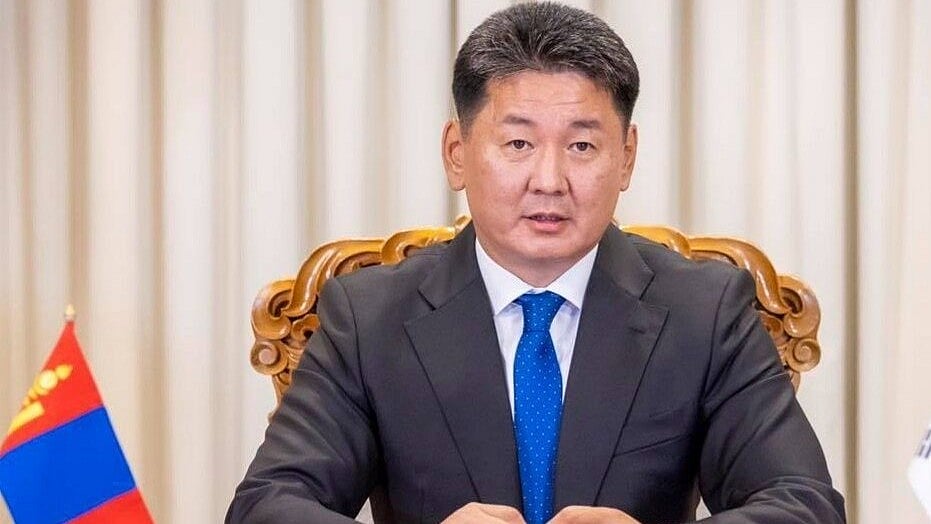World
Mongolia, India bhai-bhai: When Rajiv Gandhi sent a Buddhist emissary
Jairam Ramesh also recalls how India played a key role in ushering Mongolia into the United Nations in 1961, an instance of our early Asian diplomacy

In a historical moment for Asian diplomacy, Mongolian president Khurelsukh Ukhnaa arrived in New Delhi on Monday, 13 October, accompanied by a high-powered delegation, marking a renewal of a long friendship between the two democracies — two nations already bound by civilisational, cultural and spiritual ties.
The visit, seen as a reaffirmation of the ‘spiritual partnership’ between India and Mongolia, comes nearly seven decades after the two nations formally established diplomatic relations in December 1955 — a bond that was deepened through a shared heritage rooted in Buddhism.
Congress leader Jairam Ramesh, reflecting on this historic relationship, noted that India played a pivotal role in Mongolia’s admission to the United Nations in October 1961, underscoring New Delhi’s early diplomatic outreach in Asia.
Ramesh also described a transformative turning point in bilateral ties during the tenure of Prime Minister Rajiv Gandhi, who in October 1989 made an “inspired appointment”, choosing the 19th Kushok Bakula Rinpoche as India’s ambassador to Mongolia. The revered Buddhist monk and statesman from Ladakh assumed office in January 1990 and served a full 10 years in Ulaanbaatar.
Published: undefined
“Bakula Rinpoche was not merely a diplomat; he was a bridge between civilisations,” Ramesh wrote. “He helped Mongolia rediscover and celebrate its Buddhist identity after decades of suppression under communist rule. His contribution remains unmatched — he continues to be an iconic figure in Mongolia.”
Indeed, Bakula Rinpoche’s influence transcended diplomacy. Following the collapse of communism, he became a guiding light in Mongolia’s spiritual renaissance, playing an instrumental role in reviving monasteries, Buddhist scholarship and, yes, cultural exchanges with India.
"In recognition of his contributions, the Leh Airport was renamed the Kushok Bakula Rinpoche Airport on 10 June 2005 by then-prime minister Dr Manmohan Singh, who hailed him as the ‘architect of modern Ladakh’,” Ramesh said, adding that the revival of Buddhism not only in Mongolia but also across the former Soviet bloc and in India itself owes much to Bakula Rinpoche’s tireless efforts.
However, Ramesh also used the occasion of the current Mongolian president’s visit to turn attention inward, lamenting the neglect of Bakula Rinpoche’s homeland — Ladakh. “Today, Ladakh, the land of Bakula Rinpoche, awaits a healing touch — from the nation, but most of all from the leadership that once promised it constitutional protection under the Sixth Schedule,” he said, referring to the BJP’s unfulfilled 2020 election promise to the local hill councils.
Published: undefined
As the Mongolian president’s visit unfolds, observers watch not just a diplomatic event but a symbolic reaffirmation of India’s historical role as the custodian of Buddhist thought and as a partner in Mongolia’s spiritual and democratic journey.
The visit is expected to deepen cooperation in areas such as energy, education, culture and defence, while also revisiting the shared legacy of figures like Bakula Rinpoche — whose life continues to illuminate the spiritual corridor between the Himalayas and the steppes of Central Asia.
The Ladakh question
Meanwhile, Ramesh also accused the BJP of promising constitutional protection to Ladakh under the Sixth Schedule but now backing away from fulfilling it. He targeted the BJP while referring to the India visit of Mongolia's President Khurelsukh Ukhna.
He said, "A decisive turn in this relationship came when Prime Minister Rajiv Gandhi appointed the immensely popular and respected Buddhist monk from Ladakh, the 19th Kushok Bakula Rinpoche, as India's ambassador to Mongolia in October 1989. He took charge in January 1990 and unusually served as India’s ambassador there for ten years."
Published: undefined
Follow us on: Facebook, Twitter, Google News, Instagram
Join our official telegram channel (@nationalherald) and stay updated with the latest headlines
Published: undefined